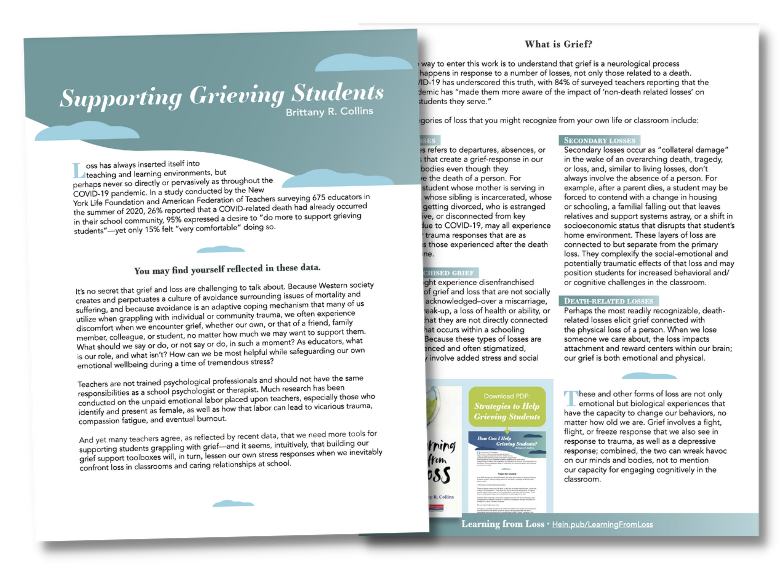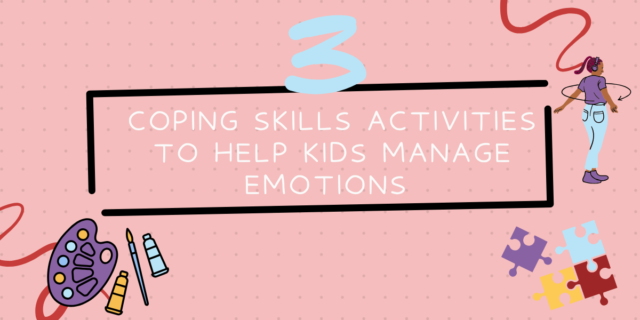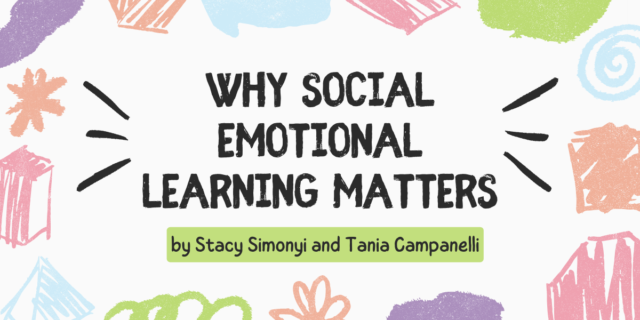
It’s no secret that grief and loss are challenging to talk about. Loss has always inserted itself into teaching and learning environments, but perhaps never so directly or pervasively as throughout the COVID-19 pandemic.
Teachers are not trained psychological professionals and should not have the same
responsibilities as a school counselor, psychologist or therapist. And yet many teachers agree that there is a need for more tools for supporting students grappling with grief. Building our grief support toolboxes will, in turn, lessen our own stress responses when we inevitably confront loss in classrooms and caring relationships at school.
Having a set of strategies to turn to when confronting loss at school helps us stay grounded and tuned-in, better serving students and ourselves by easing the path to support and ensuring we don’t invalidate students experiences or miss critical opportunities to bolster their adaptation and resilience. For some strategies to keep in mind when you encounter grief in your school or classroom, download this PDF:
We know that teaching happens through our actions as much as our words. In the face of loss, it’s important to exemplify healthy coping strategies for ourselves and our students. When loss feels ever-present, learning can offer salve. And by learning I do not mean that which is measured against state standards or purportedly revealed through tests but all that lies beneath and beyond those markers, the lessons in ingenuity and adaptation, grace and forgiveness, persistence and hope, that we hold together as and with learners, even—and especially—amidst times of loss and challenge.
It’s no secret that grief and loss are challenging to talk about. Loss has always inserted itself into teaching and learning environments, but perhaps never so directly or pervasively as throughout the COVID-19 pandemic.
Teachers are not trained psychological professionals and should not have the same
responsibilities as a school counselor, psychologist or therapist. And yet many teachers agree that there is a need for more tools for supporting students grappling with grief. Building our grief support toolboxes will, in turn, lessen our own stress responses when we inevitably confront loss in classrooms and caring relationships at school.
Having a set of strategies to turn to when confronting loss at school helps us stay grounded and tuned-in, better serving students and ourselves by easing the path to support and ensuring we don’t invalidate students experiences or miss critical opportunities to bolster their adaptation and resilience. For some strategies to keep in mind when you encounter grief in your school or classroom, download this PDF:
We know that teaching happens through our actions as much as our words. In the face of loss, it’s important to exemplify healthy coping strategies for ourselves and our students. When loss feels ever-present, learning can offer salve. And by learning I do not mean that which is measured against state standards or purportedly revealed through tests but all that lies beneath and beyond those markers, the lessons in ingenuity and adaptation, grace and forgiveness, persistence and hope, that we hold together as and with learners, even—and especially—amidst times of loss and challenge.
To learn more about Learning from Loss visit Heinemann.com.

Brittany Collins is an author, educator, and curriculum designer dedicated to supporting teachers’ and students’ social and emotional wellbeing, especially in times of adversity.Her work explores the impacts of grief, loss, and trauma in the school system, as well as how innovative pedagogies—from inquiry-based learning to identity development curricula—can create conditions supportive of all learners. She is the Founder of Grief-Responsive Teaching, a professional learning community and resource hub that supports students' and teachers' wellbeing in times of loss.
Brittany is passionate about connecting theory and practice to foster collaborative relationships with students, teachers, and writers around the world. She is the Teaching & Learning Coordinator and Manager of Global Writing Workshops at Write the World LLC, where she designs, develops, and implements original writing curricula and supports middle and high school students and teachers across continents.
Her writing has appeared in The Washington Post; Education Week; Edutopia; Inside Higher Ed; We Need Diverse Books; English Journal and Literacy & NCTE of the National Council of Teachers of English; Teachers’ and Writers’ Magazine; and Thrive Global, among other outlets, and she has developed curricula for PBS Learning Media, Write the World, Smith College, Boston University, and Race Project Kansas City, among other schools and organizations.
Brittany studied English and Education at Smith College and the University of Massachusetts, Amherst; Creative Nonfiction at the Yale Writer’s Workshop; and is pursuing her certificate in Trauma Studies from the Trauma Research Foundation.
You can connect with Brittany on her website or on Twitter.


